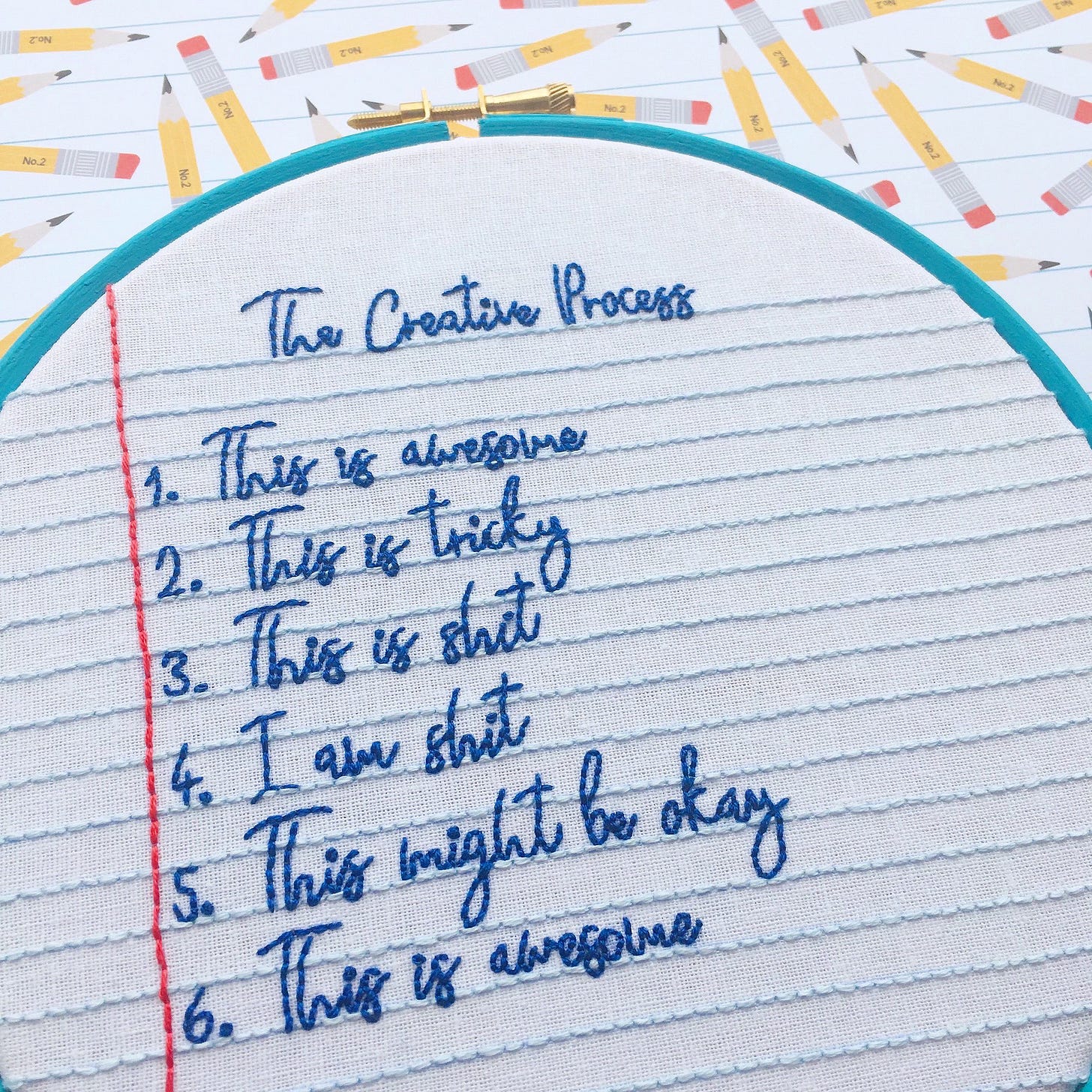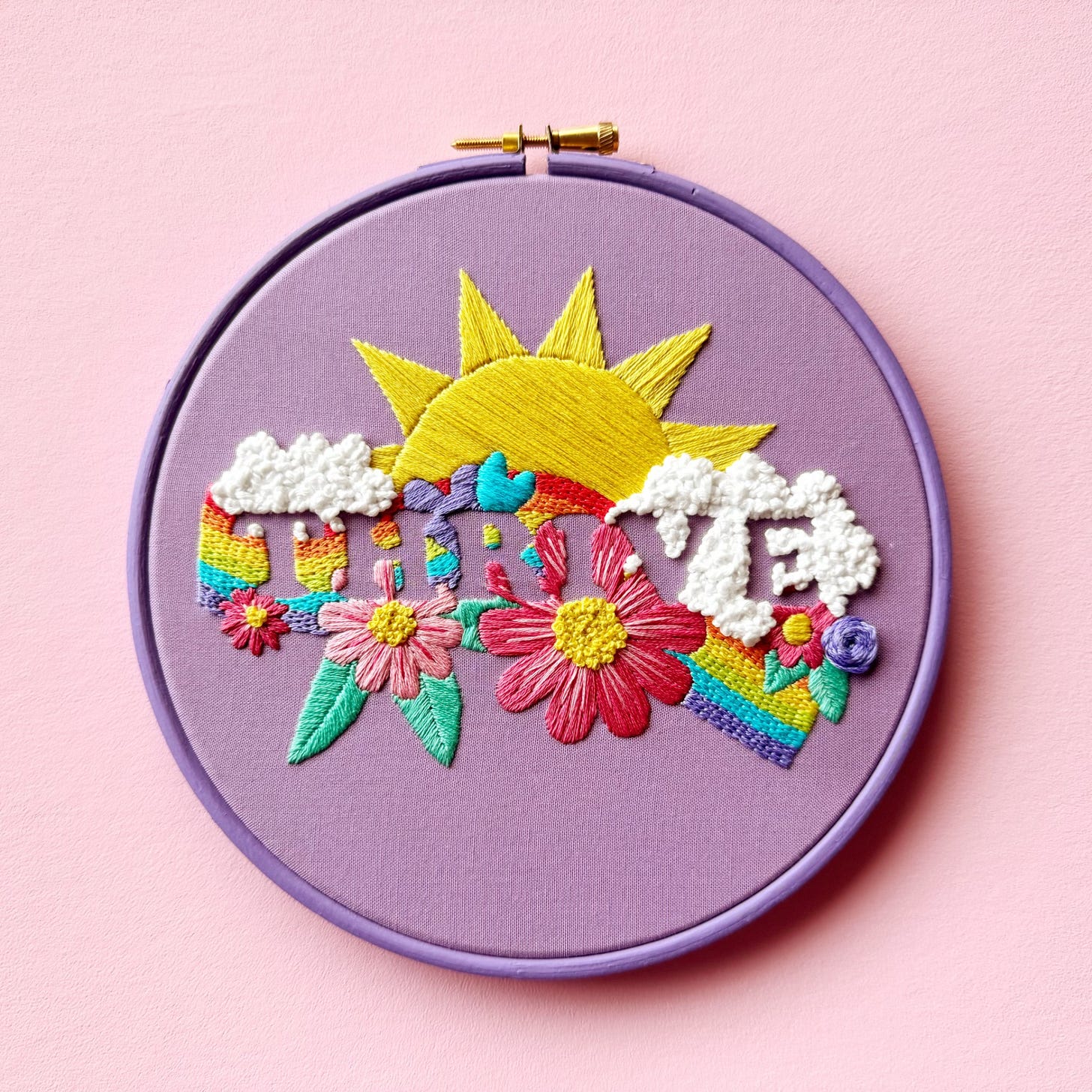Give yourself permission to begin
Why it's so important to hold space for yourself as a beginner
This week I shared a post on Instagram about a brilliant new journalling book I’d bought, which talks about meditation as a daily practice. I really want to learn how to meditate to be able to clear my mind (which never really switches off), so I asked my followers if they had any tips to get started.
It turns out that I was completely wrong about what I thought meditation was. And the brilliant thing about being wrong was that I received so many helpful comments, links to things to read or try, offers of online and in person meditation sessions and real connection with people through so many meaningful conversations.
I could have waited until I knew more about it before posting. That might have meant more experience to bring to the discussion or perhaps more confidence in seeming knowledgeable about it. But I really valued the conversations that I had about other’s experiences, hearing how it has helped them and find out what to look into next from people who practice it regularly. If I’d waited until I knew more, I wouldn’t have had those conversations and perhaps would never have got around to starting. It felt good to have these conversations from a beginner’s point of view.
There were two main takeaways from this for me. The first was that even though social media feels a bit heavy and hard right now (and I mean Instagram here, I suppose), those opportunities for meaningful conversations are still there. It’s a reminder of why I started, and why I want to keep going - but on my own terms.
The second was a reminder that it’s so important to give yourself space to begin. In a world where we’re so connected, where we’re seeing people’s highlight reels and (seemingly instant) mega skills at pretty much anything from crafts to sports or even cleaning, it’s actually more important that ever to hold space for yourself as a beginner.
It’s important to remember that the skills that you see when you’re scrolling don’t just happen overnight. Everyone starts everything as a beginner.
This is a photo of one of my really early embroidery projects. It was something I made for one of my best friends who was moving into her new flat, and the words seemed appropriate! The design was something I adapted from a Flow Magazine colouring book. Looking back at it now, I would stitch it very differently - of course I would! I’ve learnt so much since I started and have obviously done SO much stitching since this project. But these early experiments gave me so much joy, as well as more of an understanding of the techniques (even when they didn’t work out). I loved stitching something that I had adapted the pattern for, and it was one of the things that led me to start designing my own. Several years later and I’m waiting for my second book to be released at the end of March. I didn’t have a clue about all of that when I stitched this!
You don’t have to make a living from whatever it is that you do creatively, it can be something you do for a hobby without it turning into a side hustle. The main thing is that you just have to keep showing up for it. You keep showing up for it because it’s something that you want to explore. And you want to explore because you get so much more out of it than just the thing you have made - it’s about the process as well as the product. The process can help our mental health, it can be a way of meeting others and forming new connections, and it can teach us things about ourselves that we never knew before. That’s why the process is key to creativity, and you need to allow yourself to begin to be able to access the joy of it.
Ways you can allow yourself to be a beginner
I’ve been thinking about what it means to be a beginner and what’s been helpful to learn and understand throughout my own creative journey. Here are a few ways that you can allow yourself to be a beginner when you’re starting out your own creative explorations:
1 - Give yourself time
Be generous in allowing yourself time to explore. You can’t learn a new skill if you don’t give yourself time to practice, and it will take time (see next point!). You don’t have to dedicate huge chunks of time to something if that isn’t possible, even regular pockets of time can be enough to work on something. Build this up regularly and you’ll get more into it and start to feel like you’re getting into the swing of things.
2 - Be patient with yourself as you learn
It can be a challenge, but try to be patient with yourself as you experiment with new creative mediums. You might find that you’ve found your calling and that everything comes very easy and naturally to you with this new found skill, and that’s amazing! Enjoy it! But equally (and perhaps more likely for most of us) you won’t get everything right first time. Be patient with yourself as you learn. Make notes of useful things that you learn along the way so that you’re learning as you go.
3 - Remember that we learn through making mistakes
To quote the great Duo from Duolingo: “Mistakes are how we learn.” (My daughter is learning German on the app and I am always reminding her of this!) It can be incredibly frustrating when you make mistakes as a beginner. Those self-deprecating thoughts come in as you wonder why you’re finding it so hard, or you might feel annoyed that you’ve wasted the materials that you bought when you’ve made a mistake.
However, I’d love for you to try to come at your new creative pursuit with the idea that nothing is really wasted. The time spent has helped you to slow down, you’ve spent it exploring and experimenting and that’s a positive thing. You might have spent money on materials that will never see the light of day again, but you have learnt more about how they feel, what works well when you use them and (hopefully) what you’re going to try with them next time. Recycle them where you can and think about how you might be able to incorporate them into something, or even save them as your test materials.
4 - Try not to compare yourself to others
This is probably one of the hardest things to do, and acknowledging this repeatedly throughout the creative process is very important. Often we’re comparing our beginner selves to people who’ve been doing the thing for years, or decades even. Try to remind yourself that you’re right where you need to be, and that it’s okay to be a just start. It’s also helpful to remind yourself again that everyone starts everything as a beginner.
5 - Trust the process
The creative process has its natural ups and downs, and when you’re feeling stuck creatively it can be the hardest thing to get your head around. But there is always a process to it, and things will come around and feel more positive again. The hoop that’s at the top of this post says it all really! The words are by the artist David Shrigley, and I stitched this as a personal project a few years ago as a reminder.
6 - You don’t have to share it with the world
We might feel pressure to share our new creative projects and adventures on social media, or even with friends and family. But you don’t have to. You can keep it for yourself if that feels better to you. Although I said earlier in the post that sharing my questions about meditation actually proved beneficial, this doesn’t mean that you have to do the same. Also, it doesn’t mean that sharing later on when you’ve got more experience is a bad thing either!
Think about why you want to share it and what you would gain from that. Is it meaningful connections? Genuine advice or feedback?
Then think about what you would gain from keeping it to yourself. Maybe you want something that’s just for you? Maybe you’d rather research it on your own anyway? Thinking about both of these questions may guide you - but always do what works for you on your own terms.
I’d love to know your thoughts about being a beginner when it comes to something creative. Do you enjoy it or do you feel the pressure to make progress really quickly? Let me know in the comments!
And if you’re looking to try something new, why not pledge to join my paid Embroidery Membership right here on Substack? It’s launching on 30th January, and whether you’re a beginner or more experienced stitcher, you’ll love creating this design. Yes, you can stitch this THRIVE hoop as a beginner!
You can read more about how my Embroidery Membership works in this post 👇🏻
Come and join our community of stitchers - we’ll get to know each other and enjoy taking time out to be creative together!
If you pledge to join before 30th January, payment won’t be taken from your account until the launch on that date. If you have any questions at all then do let me know! I really hope you’ll join us 😊







Such great advice, thank you. As a knitter of many years I vividly remember how hard I found it to learn to crochet, but even harder was the mindset of not immediately being able to produce something of "good enough" quality. I found it really hard to go through the messy middle stage, and even now it's still very much a work in progress.
I always felt that for certain creative activities, writing especially, a certain mood has to first present itself (one where you turn into a middle-aged man pensively holding glass of whiskey and smoking a cigarette in a dim lit room). And so I never really get around to it. For painting and drawing I seem to randomly give myself a hall pass: I see it much more as a fun activity than something that should produce anything of quality. And therefore I do it much more often, which ironically improves my painting much more than my writing, even though I'd much prefer it the other way around. It's weird how these distinctions between types of creativity have come about in my brain, really.